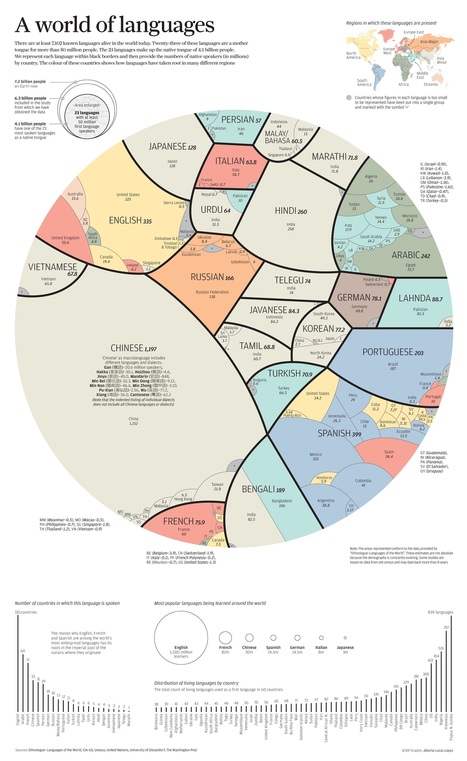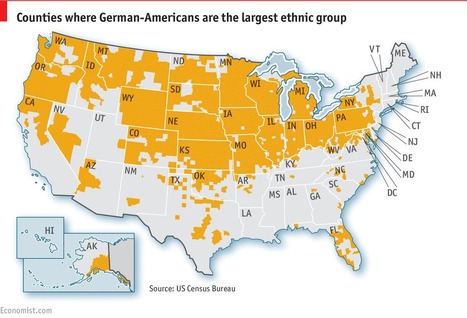"There are about 7,000 languages spoken around the world -- and they all have different sounds, vocabularies and structures. But do they shape the way we think? Cognitive scientist Lera Boroditsky shares examples of language -- from an Aboriginal community in Australia that uses cardinal directions instead of left and right to the multiple words for blue in Russian -- that suggest the answer is a resounding yes. 'The beauty of linguistic diversity is that it reveals to us just how ingenious and how flexible the human mind is,' Broditsky says. Human minds have invented not one cognitive universe, but 7,000."
Get Started for FREE
Sign up with Facebook Sign up with X
I don't have a Facebook or a X account
 Your new post is loading... Your new post is loading...
 Your new post is loading... Your new post is loading...

K Rome's curator insight,
October 6, 2018 7:37 PM
The linguistic differences between languages can be slight, but if politics and identity are involved (as they invariably are), these small linguistic differences can seem massive. "Languages" can occasionally be dialects with their own armies.
Scoop.it tags: language, culture, borders, political, Croatia, Serbia, Bosnia, Slovenia. WordPress TAGS: language, culture, borders, Croatia, Serbia, Bosnia, Slovenia.

Nancy Watson's curator insight,
October 15, 2017 9:42 AM
Redlining may be illegal, but is it perpetuated in the suburbs?

Kent College History's curator insight,
October 2, 2017 1:24 PM
'The great generation of women artists of the Russian avant-garde, including Natalia Goncharova, Olga Rozanova, Aleksandra Ekster, Varvara Stepanova and Liubov Popova, is by now relatively well known, as is its largely gender egalitarian, or at least gender neutral, abstract imagery. But we know much less about women artists of the 1930s under Stalin. Work from this decade is most often simply dismissed as “Socialist Realism” or “propaganda art”, yet many worked in modernist figurative styles, and saw themselves as every bit as revolutionary as the previous generation. Like their Constructivist forebears Stepanova and Popova, they continued to produce exhilarating images of emancipated Soviet women well into the 1930s, until the state ideology of woman reverted to a more traditional, feminine and maternal model of limited equality.'
Ivan Ius's curator insight,
September 5, 2017 11:38 AM
Geographic concepts: Patterns & Trends; Interrelationships; Geographic Perpsective

Uart.com's curator insight,
September 8, 2017 5:22 AM
Geography is more important than ever to explain and understand the art market in globalization and digitization turn.

Mr Mac's curator insight,
July 6, 2017 8:16 AM
Unit 7 - Gentrifications - specifically addressing "generalizations about Gentrification."

Deanna Wiist's curator insight,
September 12, 2017 9:01 PM
This post will need many disclaimers, but I think that it is a valuable addition to our gentrification materials since the key take-home point is that gentrification doesn’t happen the same way in all places (geographic context matters!). Some of the generalizations about gentrification around the country might not apply to some specific examples. Are these generalizations true in some (and possibly most) contexts? Sure, but unfortunately once people hear the word gentrification, they assume a base set of assumptions about the situation which may or may not be true. The 5 myths outlined in this video (more detail in this Washington Post article) are:
Tags: neighborhood, gentrification, urban, place, culture, economic.

Kent College History's curator insight,
June 24, 2017 6:07 PM
Stalin's Russia: Society and Culture by Ian Thatcher [1]

Colleen Blankenship's curator insight,
February 19, 2018 1:48 PM
What is your take on this? What are the positives? Negatives?
|
dustin colprit's curator insight,
September 25, 2018 10:18 PM
It's interesting how certain places try and solve communication barriers in communities. While I was in Afghanistan we often ran into this problem among many local villages. Often we would have to make use of multiple interpreters.

Corey Rogers's curator insight,
December 15, 2018 7:28 PM
It is interesting to see a country try an adapt an universal language. Since most regions of the country speak a different dialect, it will be nice to see how this works out and whether or not other places will try this too.

Ruth Reynolds's curator insight,
October 19, 2017 10:30 PM
Mother languages and where they are distributed.

Nancy Watson's curator insight,
July 29, 2017 10:23 AM
To all former and future APHG students, listen and use this knowledge.

GTANSW & ACT's curator insight,
June 20, 2017 10:34 PM
Preliminary HSc - Global challenges: Population 
Deanna Wiist's curator insight,
September 12, 2017 9:01 PM
The article headline is quite click-baity, but there is some real substance to this article. The graphs are especially useful to teach concepts such as population momentum and the age-dependency ratio. These were the key parts of the article that caught my eye:
Tags: culture, gender, labor, population, migration, Japan, East Asia. |


































This talk corresponds to the second half of Unit 3 - Culture.